Dental hypersensitivity affects approximately 20% to 32% of the Indian population, with current treatments offering limited relief. Addressing this challenge, Theranautilus, a Bengaluru-based deep-tech startup, is developing magnetically controlled nanorobots capable of navigating through dental tissues to deliver targeted treatments.
Founding Vision
Established in 2020 by Ambarish Ghosh, Debayan Dasgupta, and Shanmukh Peddi, Theranautilus emerged as a lab spin-off from the Indian Institute of Science (IISc), Bangalore. The founders envisioned leveraging nanotechnology to address unmet needs in dental care, leading to the development of their innovative nanorobotic solutions.
Nanorobotic Technology
Theranautilus's nanorobots are composed of biocompatible materials, including food-grade glass and trace amounts of iron. These nanorobots can be precisely controlled using external magnetic fields, allowing them to reach damaged areas within teeth. Once at the target site, they can form bone-like structures to treat conditions such as dental hypersensitivity.
Recent Funding and Future Plans
In November 2024, Theranautilus secured $1.2 million in seed funding led by pi Ventures. This capital injection is intended to establish an ISO-certified manufacturing facility, advance clinical development, and prepare for human trials scheduled for 2025.
Our Opinion on the News
Theranautilus's innovative approach has the potential to revolutionize dental treatments, offering more effective and targeted solutions for conditions like dental hypersensitivity. The successful integration of nanotechnology into practical healthcare applications could significantly enhance patient outcomes and set new standards in dental care.
Key Highlights:
- Founders: Ambarish Ghosh, Debayan Dasgupta, and Shanmukh Peddi
- Founded: 2020
- Headquarters: Bengaluru, India
- Technology: Magnetically controlled nanorobots for targeted dental treatments
- Recent Funding: $1.2 million seed round led by pi Ventures
- Upcoming Milestone: Human trials planned for 2025
